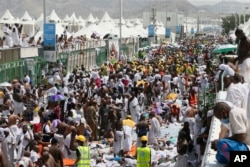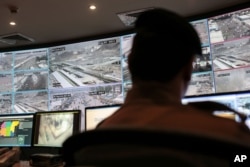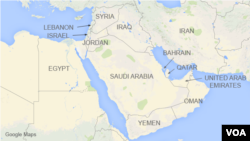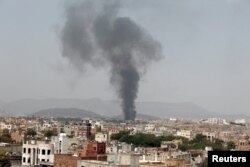The ongoing proxy war between Iran and Saudi Arabia appears to be worsening after Iran’s supreme leader, Ayatollah Ali Khamenei, scolded Saudi leaders over their alleged responsibility in last year’s hajj stampede. Pro-Iranian media have also been playing up recent pro-Iranian Iraqi Shi’ite militias sending “volunteers” to fight Saudi coalition forces in Yemen.
Iranian state TV broadcast video Tuesday of victims from last year’s hajj stampede. Tehran says hundreds of its citizens were killed and Saudi Arabia has lied about the real number of casualties.
The television report played up blistering comments by Khamenei calling Saudi leaders “little Satans and apprentice political sorcerers who ignore God and maintain their unholy grip on power" by allying themselves with what he called the world’s arrogant nations, generally a reference to the U.S. and Israel.
Saudi Arabia’s head of security for the annual Islamic pilgrimage to Mecca, General Ahmed Ahmedi, refuted the Iranian claims of Saudi negligence and insisted the kingdom does its utmost to protect visitors to the Islamic holy sites.
He said Saudi security forces take the greatest pains to serve the visitors to the holy sites and offer them the best security from their arrival to their departure.
Former Iranian president Abolhassan Bani Sadr, who lives in exile in France, told VOA the hajj pilgrimage is just one facet of the ongoing conflict between Iran and Saudi Arabia since Iran’s 1979 Islamic Revolution.
Propaganda, economic war
Bani Sadr said Khamenei is accusing Saudi Arabia of committing crimes against Muslims during the hajj, but added that Iran is guilty of crimes in the region. He said Iran and Saudi Arabia have tried to dominate the region, creating rival alliances from Iraq to Syria and Lebanon, and sowing death and destruction.
Bani Sadr stresses that there is a “propaganda war” taking place, alongside actual fighting in the battlefield, and an “economic war” that Saudi Arabia is waging against Iran by pumping excess quantities of crude to drive down prices and suffocate Iran.
University of Paris political science professor Khattar Abou Diab told VOA Saudi Arabia thinks Iran is trying to harm it as well.
He said Saudi leaders have the impression Iran is trying to encircle it by way of its maneuvering in Yemen, Iraq and the Gulf. He argues there is a danger of the ongoing proxy war developing into a direct conflict if world powers do not act to avert it.
Pro-Iranian media emphasized Monday that Yemen’s Houthi rebels have developed new ballistic missile technology and are capable of striking deep into Saudi territory. Forces loyal to former Yemeni president Ali Abdullah Saleh have fired modified SCUD rockets into Saudi territory, but it remains unclear how many they still possess.












